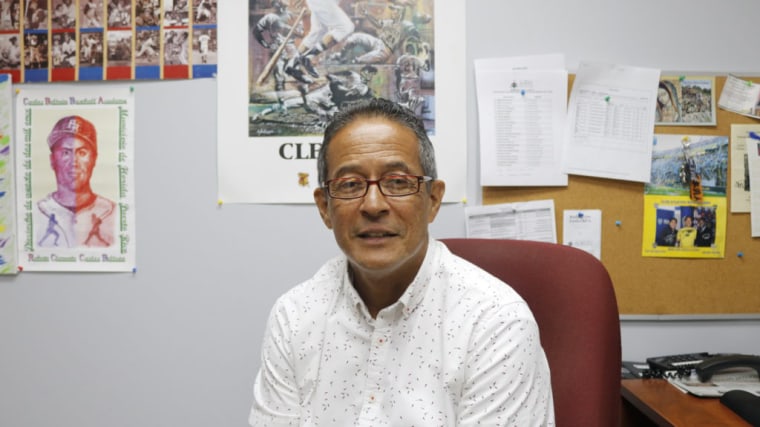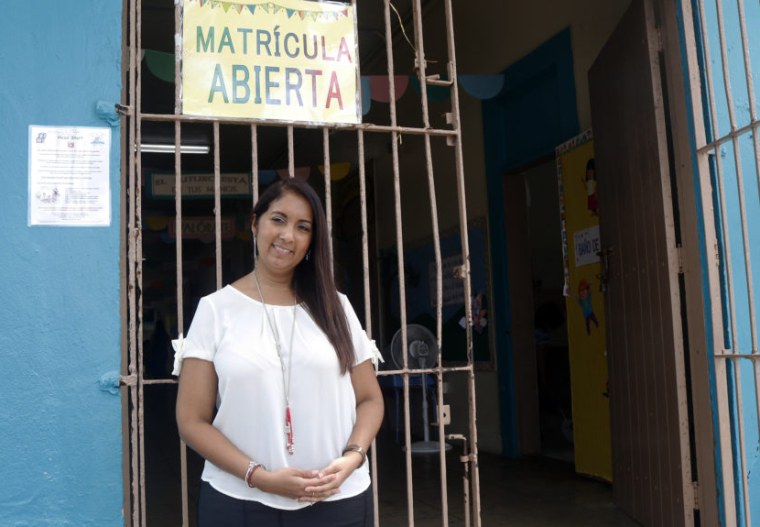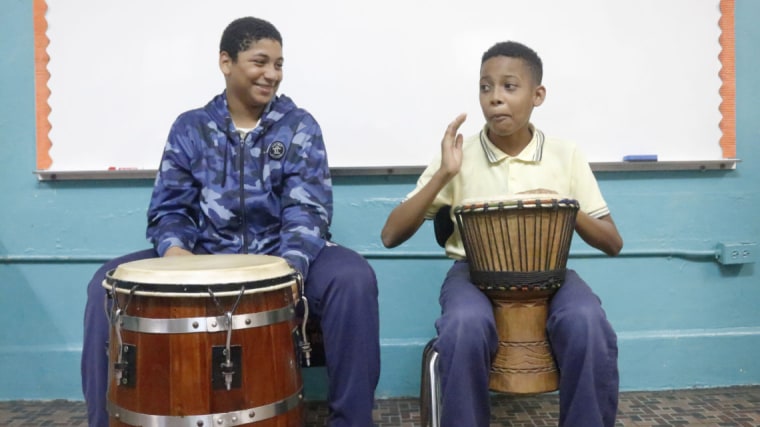SANTURCE, Puerto Rico — Sixth-grader Raynelis Dominguez González, 11, stood in a circle along with her classmates, wearing a yellow and blue school uniform with her eyes closed as she practiced breathing techniques on an overcast day in May.
Raynelis is participating in her school's music therapy workshops, an initiative led by Puerto Rico Rise Up, a female-led nonprofit organization based in Indiana. They teamed up with her school, the Dr. Francisco Hernández y Gaetan Elementary School, to bring art and music workshops to students who continue to suffer from post-traumatic stress disorder after Hurricane Maria, which devastated the island in 2017.
About 7.2 percent of children reported PTSD, according to a study that surveyed 96,108 public school students months after the storm.
Karen Caraballo, chief executive of Puerto Rico Rise Up and a psychologist, visited Puerto Rico after Maria to provide students with art education and psychotherapy workshops focused on resilience, hoping to increase access to mental health services for students facing trauma.
“The kids have learned to identify their feelings, to handle conflict in a healthier way and to express themselves in a way that is nonthreatening through dance, music and painting,” Caraballo said.
Last year, Puerto Rico Rise Up raised money through Giving Tuesday, a gala and a beauty event, to help pay for the workshops, which cost around $10,000 a year. Caraballo hopes the program can last at least two years.
Dr. Daniel Martínez Ortíz is one of the clinical psychologists who teaches the music therapy workshops with the help of college students from Carlos Albizu University in San Juan. Ortíz said Puerto Ricans of all ages are experiencing PTSD symptoms, such as high levels of anxiety and depression.
“We are still working with the communities that need help, and it’s never ending," he said. "There are a lot of schools that need help."

In November 2018, Puerto Rico Rise Up hired psychologists to visit students from third to sixth grade once a month.
The sounds of heavy winds and rain makes students anxious because it reminds them of Hurricane Maria, Ortíz said. Some students still live in homes with roofs covered in blue tarps and no consistent access to water or no electricity. Hearing a storm approaching prompts some parents to stock up on water and food or wait in a long lines to buy extra gas for the car.
Najet Hamza García, 11, tearfully said it’s frustrating to think about Hurricane Maria because her father’s cafe was completely destroyed, but the workshops have helped her deal with the frustration.
Ángel Gabriel Graciani Germán, a mental health counselor, said Puerto Ricans are not the same after Hurricane Maria. But he sees a gradual change among students as they find a way to express their creativity by channeling their concerns and emotions in the workshops. Students use music as a distracting tool so negative emotions linked to old memories don't affect them, he said.
“If we make comparisons on how the students were after the hurricane and how they are now, we have really seen some achievements in terms of social adaptation, which is what we mainly seek with the workshops,” Germán said.
The students are also learning to cope with other stressful factors; some low-income neighborhoods have vulnerable communities with many socio-economic needs and more crime.

“We are working on all the things that affect our community because the school is really the reflection of the community,” Caraballo said.
Ortíz starts it off by measuring the students' emotions, figuring out who is feeling happy, sad or neutral to compare how they feel at the end of the workshop. The students then practice breathing techniques they can use to relax when they are angry.
Yamilet Santiago, a clinical psychology student from Carlos Albizu University, writes stories to read during the workshops. She reads the story aloud and students have to fill in the blanks with “emotion” words such as “mad,” “excited” or “sad.”
One of the topics students discussed in May was transitioning to a new school as they moved to middle school. Santiago’s story was about a new girl who did not have any friends at her new school. Students, who were divided into teams, weighed the pros and cons of changing schools such as meeting new friends and teachers, being judged by other students and facing bullying.
The mental health counselor touched upon different kinds of communication: passive, passive-aggressive, aggressive and assertive. Germán worked with students on the importance of relationships and communicating in the right manner — a passive person, for example, says “yes” to everything and doesn't always take into consideration how he or she feels or thinks.
Germán explained to students how important it is to behave appropriately in a new setting.
After students interacted with psychologists and counselors, they played musical instruments. As they learned to communicate with other students, they knew when to start playing so the rhythm would flow.
The first group of students will receive a certificate at the end of the school year in completion of all the workshops. The principal plans to continue the program next year by adding theater and dance workshops for children to practice social skills, mindfulness and creativity.
“Before I was very hyperactive and the workshops helped to calm myself,” said Yariemilys Báez Conde, one of the students. “I like that we are inspired to learn about different instruments, tonalities and culture.”
This story was completed as part of a collaboration with the University of Southern California’s Annenberg School for Communication and Journalism.
Follow NBC Latino on Facebook, Twitter and Instagram.
